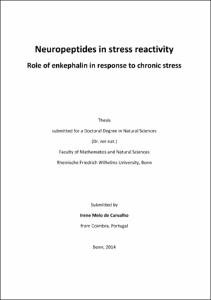Neuropeptides in stress reactivityRole of enkephalin in response to chronic stress

Neuropeptides in stress reactivity
Role of enkephalin in response to chronic stress

| dc.contributor.advisor | Zimmer, Andreas | |
| dc.contributor.author | Melo de Carvalho, Irene | |
| dc.date.accessioned | 2020-04-20T19:10:23Z | |
| dc.date.available | 2020-04-20T19:10:23Z | |
| dc.date.issued | 29.01.2015 | |
| dc.identifier.uri | https://hdl.handle.net/20.500.11811/6397 | |
| dc.description.abstract | The incidence of mood pathologies, such as chronic anxiety and major depression, is a serious health problem in modern societies. The knowledge about the molecular mechanisms involved in the development of these disorders is crucial for preventive and therapeutic approaches. Mood pathologies are complex, and rise from the interaction of genetic and environmental factors. The experience of chronic stress in everyday life is a main environmental factor for the development of mood pathologies. Therefore, identification of the biological mechanisms involved in stress response and of molecular markers underlying the individual’s vulnerability or resilience to stress-related mood pathologies is of crucial importance. Enkephalin has been shown to play an important role in stress reactivity, leading to anxiolytic and antidepressant effects under acute models of stress. Thus, in the present study, we aimed to assess the role of enkephalin in stress reactivity under chronic stress conditions. In order to do that, we submitted constitutive preproenkephalin KO (Penk KO) and WT mice to five weeks of CMS protocol, followed by analysis of the baseline corticosterone levels, as well as anxiety and depression-like phenotypes, as measures of stress adaptation. Our study revealed that constitutive Penk KO mice show a higher resilience to the behavioral and hormonal effects induced by CMS, when compared with WT animals. Exposure to CMS induced an increase in baseline corticosterone levels and anxiety and depressive-like phenotypes in the WT. In contrast, Penk KO animals exhibited resilience to the mentioned effects. In addition, we showed that CMS induces an increase in the Penk gene expression in the paraventricular nucleus of the hypothalamus (PVN) of WT mice. Therefore, enkephalin signaling pathways originating in the PVN are involved in the stress response to the CMS conditions, and may contribute to the vulnerability to the CMS effects observed in these animals. Furthermore, gene expression analyses of the endogenous opioid, glucocorticoid and CRH systems, in WT and Penk KO mice, revealed several gene expression differences between these animals. Our findings might contribute to the insights of gene expression profiles underlying vulnerable and/or resilient phenotypes to CMS conditions. | |
| dc.language.iso | eng | |
| dc.rights | In Copyright | |
| dc.rights.uri | http://rightsstatements.org/vocab/InC/1.0/ | |
| dc.subject.ddc | 570 Biowissenschaften, Biologie | |
| dc.subject.ddc | 610 Medizin, Gesundheit | |
| dc.title | Neuropeptides in stress reactivity | |
| dc.title.alternative | Role of enkephalin in response to chronic stress | |
| dc.type | Dissertation oder Habilitation | |
| dc.publisher.name | Universitäts- und Landesbibliothek Bonn | |
| dc.publisher.location | Bonn | |
| dc.rights.accessRights | openAccess | |
| dc.identifier.urn | https://nbn-resolving.org/urn:nbn:de:hbz:5n-38804 | |
| ulbbn.pubtype | Erstveröffentlichung | |
| ulbbnediss.affiliation.name | Rheinische Friedrich-Wilhelms-Universität Bonn | |
| ulbbnediss.affiliation.location | Bonn | |
| ulbbnediss.thesis.level | Dissertation | |
| ulbbnediss.dissID | 3880 | |
| ulbbnediss.date.accepted | 08.01.2015 | |
| ulbbnediss.institute | Medizinische Fakultät / Institute : Institut für Molekulare Psychiatrie (IMP) | |
| ulbbnediss.fakultaet | Mathematisch-Naturwissenschaftliche Fakultät | |
| dc.contributor.coReferee | von der Emde, Gerhard |
Files in this item
This item appears in the following Collection(s)
-
E-Dissertationen (4118)




